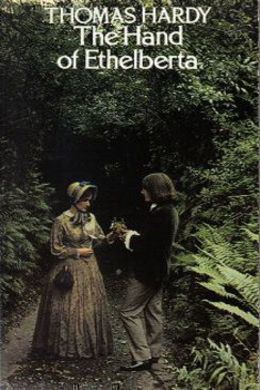
The Hand of Ethelberta
A Comedy in Chapters
by Thomas Hardy
subjects: Humorous Fiction, Satirical Fiction & Parodies
-
EPUB 970 KB
-
Kindle 1.07 MB
-
Support epubBooks by making a small $2.99 PayPal donation purchase.
Description
The only novel from Hardy that that provides a lighter tale, The Hand of Ethelberta, gives account of the life of a woman who lifts herself to the higher classes of the society.
562 pages with a reading time of ~8.75 hours (140591 words), and first published in 1876. This DRM-Free edition published by epubBooks, 2010.
Community Reviews
There are currently no other reviews for this book.
Excerpt
Young Mrs. Petherwin stepped from the door of an old and well–appointed inn in a Wessex town to take a country walk. By her look and carriage she appeared to belong to that gentle order of society which has no worldly sorrow except when its jewellery gets stolen; but, as a fact not generally known, her claim to distinction was rather one of brains than of blood. She was the daughter of a gentleman who lived in a large house not his own, and began life as a baby christened Ethelberta after an infant of title who does not come into the story at all, having merely furnished Ethelberta’s mother with a subject of contemplation. She became teacher in a school, was praised by examiners, admired by gentlemen, not admired by gentlewomen, was touched up with accomplishments by masters who were coaxed into painstaking by her many graces, and, entering a mansion as governess to the daughter thereof, was stealthily married by the son. He, a minor like herself, died from a chill caught during the wedding tour, and a few weeks later was followed into the grave by Sir Ralph Petherwin, his unforgiving father, who had bequeathed his wealth to his wife absolutely.
These calamities were a sufficient reason to Lady Petherwin for pardoning all concerned. She took by the hand the forlorn Ethelberta—who seemed rather a detached bride than a widow—and finished her education by placing her for two or three years in a boarding–school at Bonn. Latterly she had brought the girl to England to live under her roof as daughter and companion, the condition attached being that Ethelberta was never openly to recognize her relations, for reasons which will hereafter appear.
The elegant young lady, as she had a full right to be called if she cared for the definition, arrested all the local attention when she emerged into the summer–evening light with that diadem–and–sceptre bearing—many people for reasons of heredity discovering such graces only in those whose vestibules are lined with ancestral mail, forgetting that a bear may be taught to dance. While this air of hers lasted, even the inanimate objects in the street appeared to know that she was there; but from a way she had of carelessly overthrowing her dignity by versatile moods, one could not calculate upon its presence to a certainty when she was round corners or in little lanes which demanded no repression of animal spirits.
‘Well to be sure!’ exclaimed a milkman, regarding her. ‘We should freeze in our beds if ‘twere not for the sun, and, dang me! if she isn’t a pretty piece. A man could make a meal between them eyes and chin—eh, hostler? Odd nation dang my old sides if he couldn’t!’
The speaker, who had been carrying a pair of pails on a yoke, deposited them upon the edge of the pavement in front of the inn, and straightened his back to an excruciating perpendicular. His remarks had been addressed to a rickety person, wearing a waistcoat of that preternatural length from the top to the bottom button which prevails among men who have to do with horses. He was sweeping straws from the carriage–way beneath the stone arch that formed a passage to the stables behind.
‘Never mind the cursing and swearing, or somebody who’s never out of hearing may clap yer name down in his black book,’ said the hostler, also pausing, and lifting his eyes to the mullioned and transomed windows and moulded parapet above him—not to study them as features of ancient architecture, but just to give as healthful a stretch to the eyes as his acquaintance had done to his back. ‘Michael, a old man like you ought to think about other things, and not be looking two ways at your time of life. Pouncing upon young flesh like a carrion crow—’tis a vile thing in a old man.’
“Tis; and yet ‘tis not, for ‘tis a naterel taste,’ said the milkman, again surveying Ethelberta, who had now paused upon a bridge in full view, to look down the river. ‘Now, if a poor needy feller like myself could only catch her alone when she’s dressed up to the nines for some grand party, and carry her off to some lonely place—sakes, what a pot of jewels and goold things I warrant he’d find about her! ‘Twould pay en for his trouble.’
‘I don’t dispute the picter; but ‘tis sly and untimely to think such roguery. Though I’ve had thoughts like it, ‘tis true, about high women—Lord forgive me for’t.’
‘And that figure of fashion standing there is a widow woman, so I hear?’
‘Lady—not a penny less than lady. Ay, a thing of twenty–one or thereabouts.’
‘A widow lady and twenty–one. ‘Tis a backward age for a body who’s so forward in her state of life.’
‘Well, be that as ‘twill, here’s my showings for her age. She was about the figure of two or three–and–twenty when a’ got off the carriage last night, tired out wi’ boaming about the country; and nineteen this morning when she came downstairs after a sleep round the clock and a clane–washed face: so I thought to myself, twenty–one, I thought.’
